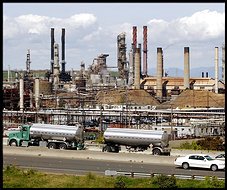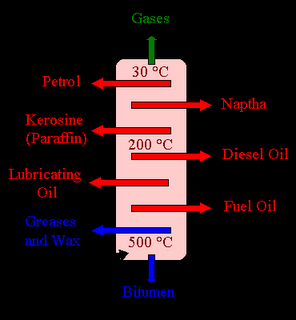Why Are Gas Prices So High?

"It's gasolicious!" -- American SUV owner, circa 2004 A.D.
"The oil industry is important to us." - Sen. Byron Dorgan (D-N. Dakota) 04/05/2006 via C-SPAN.
"Fraud is a crime of opportunity." - Rep. Gene Taylor (D-Mississippi) 06/13/06 via C-SPAN.
Sure is. I remember when corporate monopolism
was considered by law to be
deleterious to fair competitive struggle. It seems the laws have been changed to protect the strong.
The rich can take care of themselves but those of us who live closer to the middle want our finances
managed well by those we assign as caretakers.
I also remember the U.S. Constitution was written by 55 white men. Of course, I wasn't there but I read they
gathered in a back room in a house in
Philadelphia, PA., which was probably the first and only time political backroom dealings produced
something good for this country. It's been roughly a couple of hundred years since it was written.
Because of that hallowed and consensual document we tout ourselves as the greatest and most successful
democracy in the history of humankind. But since that historically auspicious occasion what kind of a
country have we become?
I mean, where is all our money going? The CIA, the military, as well as the
aforementioned corporate "contractors" are the main American occupiers, so perhaps their ledgers will
yield some answers?
Responsible politics means confronting real issues. There's much to be concerned about in today's
world. We are a people who always talk about our Rights - how about some discussion of our wrongs? You know, it takes three
lefts to make a right not two (or more) wrongs.
I'm sure (former) Secretary of
Defense Donald Rumsfeld
would
characterize that as, "Stinkin' thinkin'."We may disagree on individual notions
but we should all agree on what is fundamentally best for the majority of people here and elsewhere. We
don't live in a vacuum. It's a mixing bowl/melting pot. But look at the stew we're making (menudo, anyone?).
It's a big, wide, world we live in and I'm enjoying life very much, thank you.However, what of those who do not because of economic disenfranchisement
with its attendant insecurities and hardships? What must that do to a person? I think it would cause
much stress and unhappiness leading to anger and depression - i.e., chaos.
In a
functional economy the goal is for everyone to work and contribute so all may prosper. In a
dysfunctional and corrupt economy the goal is
exploitation for profiteering purposes. Governments were created to manage populations. How and who
does the managing is a most significant issue. The officials we choose (through votes) to administer
this office are responsible for carrying out the wishes of the majority of the population (not just the
voters) by the way they apportion our taxes.I'm not one to "nickle and dime" things.
As a downtown Los Angeles (micro-)
businessman I understand the use of money as a tool - but to make large, speculative investments with
the federal treasury to the point of bankrupting our nation
is not something I can stand idly by watching with my mouth
agape. As we spend literally $11 million dollars AN HOUR on the rapacious destruction of one of the
greatest meccas of Civilization even as we shift the wealth of the U.S. into the hands of the superrich.
(Bechtel? Halliburton?General Electric? )
On the face of
it--if you believe the hype--it appears most of
us support the current
administration. Being patriotic,
being nationalistic ,
being proud of and loyal
to your country are NOT right-wing notions - they are truly common left-wing American values
 that only appear co-opted by reactionary extremists. *Sigh* I
only ask for something tangible to hold onto. Give me something real that I can feel, not some
media-indulgent mass hypnosis to shape my view!
that only appear co-opted by reactionary extremists. *Sigh* I
only ask for something tangible to hold onto. Give me something real that I can feel, not some
media-indulgent mass hypnosis to shape my view!
While we're waiting, I'd like to give you the
4-1-1 on the relatively short but aggressive history of the mechanics of oil and gas production in the
United States. It may sound boring but surprises abound.
Let's begin with the present
, look at the
past
, then extrapolate forward into the future.
I will illustrate 3 simple points:
1) The real price of gas for refiners.
2) The real cost of gas to the consumer.
3) The real
chumps we Americans are.
U.S./World Fuel Prices
According to Dr Gerhard P. Metschies
'
Guide to
International Fuel Prices --{2005 4th Edition – 172 Countries ); Commissioned by
the Federal Ministry for Economic
Cooperation and Development (BMZ) Contact: Dr. Simon Koppers,
Division 313 - Water, Energy, Urban Development, Tel.: +49 (1888) 535-3109}-- in 2005 the. . .
- Price of Crude Oil on the World Market was 27 U.S. cents per Liter = 43 U.S. dollars per Barrel
- Retail Price of Gasoline in the United States was 54 U.S. cents per Liter
- Retail Price of Gasoline in Luxembourg was 119 U.S. cents per Liter
Note: The fuel prices of
the United States are average costs covering retail prices including industry margin, VAT (Value Added
Tax)and including approximately 10 U.S. cents for the two road funds (federal and state). This fuel
price being without other specific fuel taxes may be considered as the international minimum benchmark
for a non-subsidized road transport policy. The fuel prices of Luxembourg are the approximately minimum entrance level for
new European Union accession countries.
So if it cost U.S. oil companies 54 cents per liter to sell gasoline to the public in 2005, why did it cost us about two dollars and 50 cents a gallon to buy it? Maybe it's for the same reason audio CDs cost about 75 cents each to make but are sold to us for about $12 -18 dollars. Some people call it unfair profitting through price gouging; others say it's fair profit due to what the market will bear. I think it 's more along the lines of the erroneously attributed P.T. Barnum motto: "There's a sucker born every minute!"
I
Can't Afford My Gasoline! 
Now let's be clear about the
definition of
gasoline: It is a volatile mixture of flammable liquid
hydrocarbons derived chiefly from crude petroleum and used principally as a fuel for internal-combustion
engines.
Hydrocarbons are
molecules of varying length and complexity made of hydrogen
and
carbon. Their various structures give them their differing properties and thereby uses. The
trick in the oil refinement process is separating and purifying these. All these different hydrocarbons have
different boiling points, which means they can be separated by distillation. Gasoline is produced in
oil refineries  from crude oil via distillation.
from crude oil via distillation.
Crude oil
 is the term for "unprocessed" oil - the stuff that comes out of the
ground
is the term for "unprocessed" oil - the stuff that comes out of the
ground  . It is also known
as petroleum. Crude oil is a fossil fuel, meaning that it was made naturally from decaying plants and
animals living in ancient seas millions of years ago -- anywhere you find crude oil was once a sea bed
. It is also known
as petroleum. Crude oil is a fossil fuel, meaning that it was made naturally from decaying plants and
animals living in ancient seas millions of years ago -- anywhere you find crude oil was once a sea bed
 . Crude oils vary in color, from clear to tar-black, and in
viscosity, from water to almost solid.
Once oil has been produced
from an oil field
. Crude oils vary in color, from clear to tar-black, and in
viscosity, from water to almost solid.
Once oil has been produced
from an oil field  , it is treated with chemicals and heat to remove
water and solids, and the natural gas is separated
, it is treated with chemicals and heat to remove
water and solids, and the natural gas is separated  .
The oil is then stored in a tank
.
The oil is then stored in a tank  , or
battery of tanks
, or
battery of tanks  , and later
transported to a refinery
, and later
transported to a refinery  ,
by truck
,
by truck  , railroad tankcar
, railroad tankcar  , barge
, barge
, or pipeline
 . Large oil fields all have direct outlets
to major, common-carrier pipelines
. Large oil fields all have direct outlets
to major, common-carrier pipelines .
.
American History X
The basic refining tool is the distillation unit.
Crude oil begins to vaporize at a
temperature somewhat less than that required to boil water. Hydrocarbons with the lowest
molecule weight vaporize at the lowest
temperatures, whereas successively higher
temperatures are required to distill larger molecules.
The first material to be
distilled from crude oil is the gasoline fraction, followed in turn by naphtha and
then by kerosene  . The residue in the kettle, in the old still refineries, was then
treated with caustic and sulfuric acid, and finally steam distilled thereafter. Lubricants and
distillate fuel oils were obtained from the upper regions and waxes and asphalt from the lower regions
of the distillation apparatus.
. The residue in the kettle, in the old still refineries, was then
treated with caustic and sulfuric acid, and finally steam distilled thereafter. Lubricants and
distillate fuel oils were obtained from the upper regions and waxes and asphalt from the lower regions
of the distillation apparatus.
Therefore, in the process of refining oil and
producing high-end products, gasoline, naphtha, and kerosene were waste by-products that used to be
dumped into rivers and streams. It wasn't until the incorporation of gasoline as a fuel to power
internal-combustion engines that it was seen as having real add-on value. To reiterate: Gasoline was not invented,
GASOLINE IS A WASTE BY-PRODUCT of the refining process, kerosene being the principal product.
In the later 19th century
the gasoline and naphtha fractions were actually considered a
nuisance because little need for them existed, and the demand for kerosene also began to decline because
of the growing production of electricity and the use of electric lights. With the introduction
of the automobile, however,, the demand
for gasoline suddenly burgeoned, and the need for greater supplies of crude oil increased accordingly.
Before internal combustion engines were
invented in the mid-1800s, gasoline was sold in small bottles as a treatment against lice and their eggs.
At that time, the word "Petrol" was a trade name. This treatment method is no longer common because of
the inherent fire hazard and the risk of dermatitis
, and because gasoline
is a carcinogen,
causing those who repeatedly use it on the skin over significant periods of time to develop cancerous
growths  .
.
In an email exchange with author Richard Heinberg dated 06/10/06 I asked if my assertion that it costs
practically nothing for refineries to make gasoline was correct? My argument has always been the price
of gasoline is strictly arbitrary, for other than the costs of chemical additives, transportation, and
storage the price of gasoline is pure profit for the oil industry! In reality, the price of gasoline
today should be around fifty cents a gallon!
Heinberg responded,
"Well, refining is not free. There are definitely costs involved for heat, storage, pumping, and so
on. . . Altogether, refining costs represent considerably less than 20% of the final cost of the
product."
Back To The Future 
In his book,
"The Party's Over, Oil, War, and the Fate of Industrial Societies," Heinberg writes, "Oil has been the
cheapest and most convenient energy resource ever discovered by humans. During the past two centuries,
people in industrial nations accustomed themselves to a regime in which more fossil-fuel energy was
available each year, and the global population
grew quickly to take advantage of this energy windfall. Industrial nations also came to rely on an
economic system built on the assumption that growth is normal and necessary, and that it can go on
forever. When oil production
peaks, those assumptions will come crashing down.
"So when Mike Bowlin ,
former Chairman of ARCO, said in 1999, "
We've embarked on the beginning of the last days of the age of oil," he was voicing a truth that many others in
the petroleum industry knew but dared not utter. Over the past few years, evidence has mounted that
global oil production is nearing its historic peak. . .
As we move from a historic interval of energy growth to one of energy decline, we are entering uncharted
territory. It takes some effort to adjust one's mental frame of reference to this new reality. . .
"When the global peak in
oil production is reached, there will still be plenty of petroleum in the ground - as much as has been
extracted up to the present, or roughly one trillion barrels. But every year from then on it will be
difficult or impossible to pump as much as the year
before ."
Clearly, we will need to find substitutes for oil. But an analysis of the
current energy alternatives is not reassuring."
Solar and
wind are renewable, but we now get less than one percent of our
national energy
budget from them; rapid growth will be necessary if they
are to replace even a significant fraction of the energy shortfall from post-peak oil.
Nuclear power is dogged by the unsolved problem of
radioactive waste disposal. [Click here to participate in a Virtual Nuclear Plant Crisis demonstration.]
Hydrogen is not an energy source at all,
but an energy carrier: it takes more energy to produce a given quantity of hydrogen than the hydrogen
itself will yield. Moreover, nearly all commercially produced hydrogen now comes from natural gas -
whose production will peak only a few years after oil begins its historic decline.
"Unconventional petroleum resources - so-called "heavy oil," "oil sands," and "
shale oil" - are plentiful but extremely costly to
extract, a fact that no technical innovation is likely to change.
"The oil peak will impact international relations," writes Heinberg.
"Resource conflicts are nothing new: pre-state societies often fought over agricultural land, fishing
or hunting grounds, horses, cattle, waterways, and other resources. Most of the wars of the twentieth
century were also fought over resources - in many cases, oil. But those wars took place during a period
of expanding resource extraction; the coming decades of heightened competition for fading energy
resources will likely see even more frequent and deadly conflicts."
In the hands of the
irresponsibly powerful the end results can be lethal to all humanity.Heinberg continues: "The US - as the world's largest
energy consumer, the center of global industrial empire, and the holder of the most powerful store of weaponry in world
history - will play a pivotal role in shaping the
geopolitics of the new century.To many
observers, it appears that oil interests are already at the heart of the present administration's
geopolitical strategy.
"Here's a suggestion: Spend at least 20 minutes appreciating energy's
role in the life of your city; imagine what the scene you are viewing would look like if there were 10
percent less energy available. What substitutions would be necessary? What choices would people make?
What work would not get done? Now imagine the scene with 25 percent less energy available; with 50
percent less; with 75 percent less.
"Assuming that the peak in global oil production occurs in the
period from 2006 to 2015 and that there is an average two percent decline in energy available to
industrial societies each year afterward, in your imagination you will have taken a trip into the
future, to perhaps the year 2050.
"The hard math of energy resource analysis yields an
uncomfortable but unavoidable prospect: even if efforts are intensified now to switch to alternative
energy sources, after the oil peak industrial nations will have less energy available to do useful work
- including the manufacturing and transporting of goods, the growing of food, and the heating of homes.
"The consequences for global food
production will be no less dire. Throughout the twentieth century, food production expanded
dramatically in country after country, with virtually all of this growth attributable to energy inputs.
Without fuel-fed tractors and petroleum-based fertilizers, pesticides, and herbicides, it is doubtful
that crop yields can be maintained at current levels.
"This suggests a fundamental change of
direction for industrial societies - from the larger, faster, and more centralized, to the smaller,
slower, and more locally-based; from competition to cooperation; and from boundless growth to self-
limitation.
"The likely economic consequences of the energy downturn are enormous. All human
activities require energy - which physicists define as "the capacity to do work." With less energy
available, less work can be done - unless the efficiency of the process of converting energy to work
is raised at the same rate as energy availability declines. It will therefore be essential, over the
next few decades, for all economic processes to be made more energy-efficient. However, efforts to
improve efficiency are subject to diminishing returns, and so eventually a point will be reached where
reduced energy availability will translate to reduced economic activity. Given the fact that our
national economy is based on the assumption that economic activity must grow perpetually, the result
is likely to be a recession with no bottom and no end.
"There is much that individuals
and communities can do to prepare for the energy crunch. Anything that promotes individual self-reliance
(gardening, energy conservation, and voluntary simplicity) will help. But the strategy of individualist
survivalism will offer only temporary and uncertain refuge during the energy down-slope. True
individual and family security will come only with community solidarity and interdependence. Living in
a community that is weathering the downslope well will enhance personal chances of surviving and
prospering far more than will individual efforts at stockpiling tools or growing food.
"Meanwhile, nations must adopt radical energy conservation measures, invest in renewable energy research, support sustainable local food systems instead of
giant biotech agribusiness
, adopt
no-growth economic and population policies, and strive for international resource cooperation agreements."
*********************
If you've
read this far, I thank you. And if you want to know more about Oil Depletion and The Collapse of the
American Dream then I suggest the video, "The End of Suburbia," produced by documentarian Barry
Silverton. If you're really ready to go down the rabbit hole of this worldwide culture change allow
the following web link to be your starting place. Caution: the hole goes deep... The End of Suburbia.com
The End of Suburbia.com
(c. 2006) Vachelle McFarland
